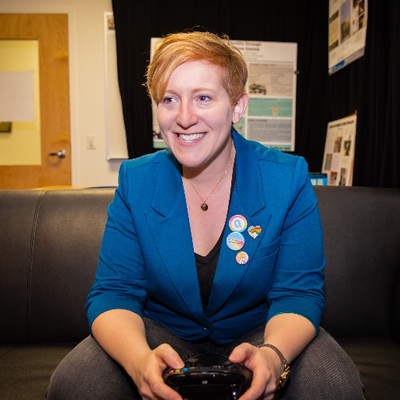I originally posted this on Medium before the 2016 Game Developers Conference, but it offers helpful tips for allies in all types of situations, especially game and tech spaces!
We all know that games culture and the games industry can be hostile toward those who are different. Even though the Game Developers Conference is a professional setting, discrimination still runs rampant. I have been attending GDC on and off since 2007 — and, while I’ve seen definite improvements over the years, the conference can still be an immensely stressful time for people who don’t fit the model of the white, cisgender, male, straight game dev. That’s because we know, we KNOW, that we are going to have a long line of run-ins, both big and small, with folks who think we don’t belong or we have to work harder to prove our value.
I’m happy to say that, these days, there are more and more of those male game dev types who think of themselves as “allies” to causes of diversity. They support women, people of color, queer people, and people with disabilities in games — at least, they do in theory. In practice, many of the “allies” I know say and do lots of discriminatory things. They are very well-intentioned, but since they already think of themselves as “good guys,” they forget that being an ally is hard work. It means remaining self-aware, self-critical, and actively working to make games a better place for all.
With the conference nearly upon us, and in the spirit of the “take-away,” here are 6 easy tips for actually being an ally at GDC:
1. Assume that everyone is a games professional.
Until you learn otherwise, assume that everyone you speak to works in the games industry or game-related fields. Assume that they are competent, informed, and equally worthy of your time. When speaking to a mixed-gender group of people, i.e. a group with some men and some women, do not — I repeat, DO NOT — address only the men. Direct your comments and your eye contact to both men and non-men equally. Often people do this without thinking; due to cultural stereotypes, they have come to assume that the women in the room are less likely to work in games. This is a professional event. Everyone is here for professional reasons. There is nothing more maddening then feeling ignored and unseen. Practically speaking, you have no idea who you’re talking to. If you’re trying to build connections, don’t shoot yourself in the foot. Here are the words of Stacey Mason.
2. Never dismiss a woman as “just someone’s girlfriend.”
Tip #1 goes for parties just as much as for events at the conference proper. When you see a woman standing arm in arm with a man in a social situation, it may be especially tempting to assume that she is “just” wife or girlfriend. First off, whatever that woman’s relationship status and/or profession, she deserves your equal respect — and secondly, just because a woman is dating a man who works in games doesn’t mean she doesn’t work in games, too. I am in a relationship with a partner who is a game designer; I am a games educator, scholar, and organizer. We both work full-time in games. I cannot tell you the number of times that a well-meaning male GDC goer, someone who thinks of himself as a “feminist” or an advocate for diversity, has all but ignored me in a group conversation. When this happens, I make a mental note to avoid working with this person or promote their work — at least until they recognize their harmful behavior.
3. Respect social cues and personal boundaries.
GDC is a great chance to meet new folks and connect with people you admire. However, it’s important to recognize when someone wants to talk and when they want space. By all means, start up lots of conversations — but avoid assuming that you have a right to someone’s time. You never know what is going on with them that makes them more of less comfortable talking with you. They may have social anxiety and need a few moments to themselves. They may have been the victim of harassment within the games industry and be understandably hesitant about interacting with new people. If they represent a marginalized group, they may already be being asked by a lot of people to speak on behalf of “their people.”
Part of respecting boundaries is also respecting personal space. GDC is a crowded place; be sure to give others as much of a buffer as you can. This is especially true for people you don’t know, or who are sending you body language cues that they’d like you to back it up. Never assume you can touch someone, even in a friendly way, without asking. Also, do not take photos of anyone without first asking their permission.
4. Watch out for words that promote discrimination.
Fellow speakers, you set an example for all GDC attendees, so this is particularly important for you — but it also goes for everyone and every conversation. Lots of people who think of themselves as allies knows not to use hate speech, like blatantly offensive language about race or sexuality. But there are also lots of “smaller” mistakes of language that can make the conference environment feel hostile to those who are different. Avoid inadvertent sexism, like referring to the imagined player for your game as “he.” Also avoid ableism, i.e. using language that associates disability with something bad (like calling someone “lame” or “crazy”). It may not seem like these words would be a “big deal,” but they’re the stuff that microaggressions are made of, and when the whole conference is swimming in them, it makes a huge difference in terms of who feels welcome and who feels like they don’t belong.
5. Don’t let bad behavior slide.
Being an ally doesn’t just mean being responsible for yourself, it also means being an active advocate for better behavior. If you see someone — a friend, a new acquaintance, a presenter — doing any of the above, let them know that you see their behavior as problematic. Depending on your style and the situation, you can do that publicly or you can take them aside individually and point out the problem. Definitely avoid “white knight syndrome,” i.e. don’t try to be the “good guy” who rides in and saves the day to great applause. At the end of the day, the struggle to promote diversity in games isn’t about you. Help out whenever you can, but do it because it’s the right thing to do, not because you want recognition for being an ally.
6. If you get called out, take it in stride.
Even if you’re trying your best to be a good ally, there’s a chance you’ll say or do something that is inadvertently problematic — and that’s okay. We all mess this stuff up sometimes. What’s important is to do your best to be humble and open to criticism. If someone calls you out, your first response may well be defensiveness. “Me? No way! I’m an ally!” Remember, it takes courage to tell someone they’ve done something that hurts you, so respect what this person has to say, make sure they know that you hear them, and let their comment help guide you to even better ally-ing in the future.
 Let me start by saying that the resources I have to offer here are small and simple. They pale in comparison to the magnitude of the anger, sadness, and grief that comes in the wake of the presidential election. However, I know that for myself and many of my colleagues who are educators, it has felt important to do something that helps in these deeply worrying times. At the same time, we are faced with impossible questions, like how do we talk to students about the state of our country when we are in shock, we are scared, and we are trying to make sense of our future?
Let me start by saying that the resources I have to offer here are small and simple. They pale in comparison to the magnitude of the anger, sadness, and grief that comes in the wake of the presidential election. However, I know that for myself and many of my colleagues who are educators, it has felt important to do something that helps in these deeply worrying times. At the same time, we are faced with impossible questions, like how do we talk to students about the state of our country when we are in shock, we are scared, and we are trying to make sense of our future?
 This semester I am teaching my last class as a postdoc at USC — which is bittersweet, because I absolutely love my students in the Interactive Media and Games Division. Luckily, my department has been wonderful about allowing me to design my own courses, so I get to go out on a great topic, “Video Games, Identity, and Diversity.” Here’s an excerpt from the class description:
This semester I am teaching my last class as a postdoc at USC — which is bittersweet, because I absolutely love my students in the Interactive Media and Games Division. Luckily, my department has been wonderful about allowing me to design my own courses, so I get to go out on a great topic, “Video Games, Identity, and Diversity.” Here’s an excerpt from the class description: Big news! After three years running as a fall event in Berkeley, the Queerness and Games Conference is moving down to Los Angeles for our fourth year. The official dates haven’t been announced yet, but we’re aiming for early April. We’re so excited to be hosting this amazing conference yet again.
Big news! After three years running as a fall event in Berkeley, the Queerness and Games Conference is moving down to Los Angeles for our fourth year. The official dates haven’t been announced yet, but we’re aiming for early April. We’re so excited to be hosting this amazing conference yet again.
